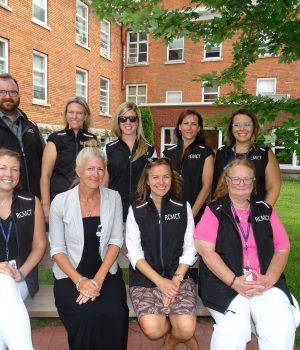
RENFREW COUNTY (Pembroke) — The Pembroke Regional Hospital (PRH) is very pleased to receive $1,100,000 in new funding for three priority areas in mental health programming; enhanced collaboration with police, improved access to short-term counselling and other community-based resources, and increased access to temporary housing.
“The funding, which is supported by the Champlain Local Health Integration Network and is part of the provincial and federal government’s commitment to invest in mental health services represents the largest investment that has taken place in many years,” said PRH President and CEO Pierre Noel. “It will have a significant impact on what is currently an $8 million budget for Mental Health Services of Renfrew County (MHSRC), a program administered by the Pembroke Regional Hospital.”
MHSRC Director Mireille Delorme said that, given recent statistics, this new funding is both timely and much needed.
“The police, who are often the front line responders for mental health and addictions calls have seen a 28% growth in the number of those calls during the past five years,” she said. “Our Mobile Crisis Team (MCT) has also seen a steady increase in referrals, and over the last two years, the number of individuals visiting emergency departments for conditions related to mental health and addictions has increased by approximately 25%.”
“Amongst other things, this additional funding will enable us to partner more closely and effectively with the police in order to ensure that individuals receive the appropriate help they need before or as they face an emerging crisis.” Ms. Delorme further outlined some of the ways this will take place.
In partnership with the OPP, the Mobile Crisis Team is working to enhance the crisis response process for mental health calls by adding professionals and clinical staff to those attending. This will now include two registered nurses who will provide assessment of medical conditions which can contribute to an emerging crisis and impact the decisions made about the right care options.
Mobile Crisis Team staff will be also be co-located with the OPP detachments in Pembroke and Renfrew. This will allow for spontaneous and coordinated co-response to calls, as well as pro-active visits with at-risk individuals throughout Renfrew County before a crisis emerges.
The Ontario Provincial Police (OPP) has already received Crisis Intervention Training which helps police recognize when mental health and/or addiction is an important component of a call, and when it’s beneficial to involve mental health professionals. Inspector Colin Slight who is the Detachment Commander for Renfrew OPP said that the OPP is excited to be moving forward with a new and enhanced collaborative response model in support of those within the community who are dealing with mental health and addictions issues.
“The OPP has enjoyed a positive relationship with our partners from MHSRC for many years. The recent completion of joint Crisis Intervention Training is an example of our commitment to working together towards safer and healthier communities. Not only will this training better enable officers to respond to persons in crisis, but it has also increased our understanding of how we can work collaboratively with our MHSRC partners in providing that response,” Inspector Slight said, adding that this will result in being able to provide the right response at the right time by the right service provider.
The Mobile Crisis Team will also be supporting emergency departments in Pembroke and Renfrew. Assigning a dedicated MCT resource for these two sites to assist those in mental health crisis will help reduce the client wait time in the ED and provide assessment and system navigation support.
The new funding will also support additional “crisis beds” in the community. Housing plays an important role in health and recovery. The Crisis Bed program provides short-term accommodation to those at risk of homelessness, until such time as longer term housing plans can be put in place.
Together with housing support, crisis clients will receive the assistance of a new Transition Support Team comprised of a social worker, a housing support worker, an addictions counsellor, a case manager and a Court Diversion worker.
“We are extremely pleased to see this additional investment for crisis mental health programming in our community,” said Crown Attorney Jeff Richardson. “The new positions will provide us with better opportunities to work with our partners to ensure that those who are in conflict with the law and who also have mental illness are dealt with in a manner that takes their mental illness into account, holds them accountable for the offences they commit and protects the public by offering ongoing support and supervision,” Mr. Richardson said.
Ms. Delorme said that, overall, the $1.1 million investment will allow for significant advancement in the mental health and addictions programs offered in our region. “Our team is excited to see these service and partnership enhancements. These should result in reduced ED visits, and improved connection to the right care at the right time, as well as a better outcome for the clients and their families,”” Ms. Delorme said.






![Kenopic/Smith Auction [Paid Ad]](https://whitewaternews.ca/wp-content/uploads/2018/10/advertising-100x75.jpeg)

